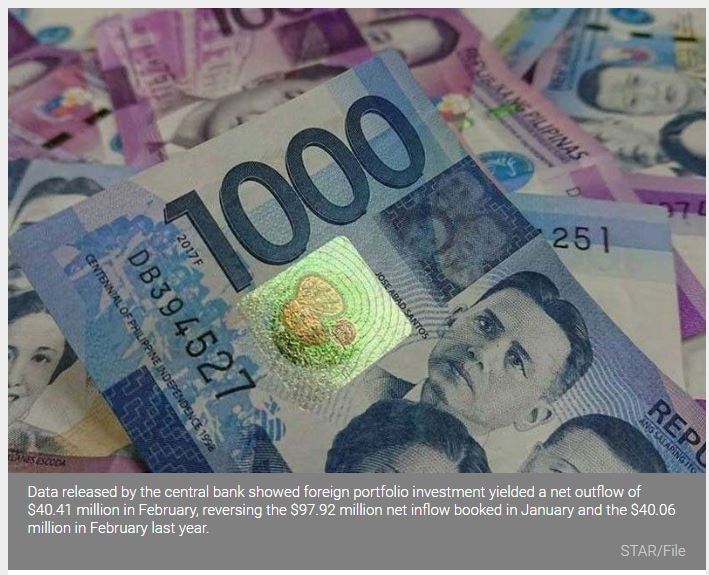More hot money exits Philippines in February
Despite passage of key laws
MANILA, Philippines — More foreign portfolio investments or speculative funds left the Philippines in February despite the passage of key laws to attract more investors amid the ongoing global health crisis, according to the Bangko Sentral ng Pilipinas (BSP).
Data released by the central bank showed foreign portfolio investment yielded a net outflow of $40.41 million in February, reversing the $97.92 million net inflow booked in January and the $40.06 million in February last year.
Foreign portfolio investments or hot money refer to purely speculative funds that quickly and regularly move within the global financial markets as investors scout for the higher short-term yields available.
Gross inflows of speculative funds slipped by 2.7 percent to $1.34 billion in end-February from $1.37 billion in the same period last year. About 39.8 percent of foreign portfolio investments were invested in securities listed on the Philippine Stock Exchange (PSE) particularly in banks, property companies, holding firms, food, beverage and tobacco companies as well as telecommunication providers.
On the other hand, 60.2 percent went to investments in peso government securities.
Major investor economies in February include the United Kingdom, Singapore, the US, Malaysia and Hong Kong, with combined shares accounting for 83.1 percent of the total.
Gross outflows increased by 3.3 percent to $1.38 billion in February from $1.33 billion a year ago.
Congress ratified key laws, paving the way for the signing of Republic Act 11523 or the Financial Institutions Strategic Transfer Act, allowing banks to dispose of bad loans through FIST corporations or special purpose vehicles, and RA 11534 or the Corporate Recovery and Tax Incentives for Enterprises (CREATE) Act, slashing the corporate income tax to 20 from 30 percent.
In February, IHS Markit reported that the country’s manufacturing activity rose to a 25-month high in January as the Manufacturing Purchasing Managers’ Index (PMI) improved to 52.5 and exceeded the neutral mark of 50.
Likewise, the BSP also decided to keep an accommodative policy stance by keeping the benchmark interest rate at a record low of two percent to help the economy recover from a pandemic-induced recession.
From January to February, the BSP said foreign portfolio investments yielded a net inflow of $57.51 million, a reversal of the $446.04 million net outflow recorded in the same period last year.
Gross inflows fell by 12.3 percent to $2.29 billion from January to February compared to $2.61 billion in the same period last year, while gross outflows plunged 26.9 percent to $2.23 billion from $3.05 billion.
The economy contracted by a record 9.5 percent in 2020, ending more than two decades of positive growth as the economy stalled when the government imposed the longest and strictest lockdown in the world.
With the resurgence of COVID-19 cases, the government has placed the National Capital Region (NCR) and nearby provinces under enhanced community quarantine anew from March 29 to April 4.
Source: https://www.philstar.com/business/2021/04/01/2088390/more-hot-money-exits-philippines-february


 Thailand
Thailand




